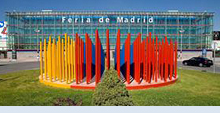 |
European Planetary Science Congress 2012
IFEMA-Feria de Madrid
23 – 28 September 2012, Madrid, Spain |
 |
|
CP2 Habitability in the Solar System and beyond |
| Convener: Olga Prieto-Ballesteros | Co-Conveners: Jean-Pierre Lebreton , Steve Vance |
|
Oral Program
/ Wed, 26 Sep, 18:15–19:45
/ Room Mars
Poster Program
/ Attendance Thu, 27 Sep, 18:15–19:45
/ Poster Area
|
Exploration of our Solar system is key to understanding constraints on the habitability in extraterrestrial settings nearby and in the Universe in general. The investigation of habitability implies a general analysis of planetary environments to determine whether they provide the requirements that life needs to begin and/or persist: liquid water for life as we know it, the right materials for building life, and sources of physical and chemical energy to maintain it. Ultimately, habitability is determined by astrophysical, geological and geochemical factors. Studies on Earth, in the laboratory and in the field, inform our understanding of where habitable environments might exist. For example, recent studies of cave ecosystems may indicate that outer Solar system satellites such as Europa, Ganymede or Enceladus, contain prospects for habitability comparable to those for Mars.
This session seeks to synthesize results from space missions, laboratory experiments, modeling, and Earth analogues field-work, to promote discussion of the relative habitability of known settings in the Solar system, and possible insights into habitable locales throughout the Universe. You are invited to submit either an oral or a poster contribution.

